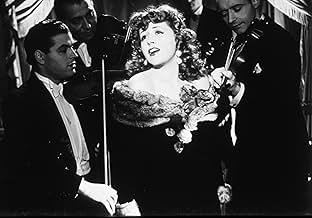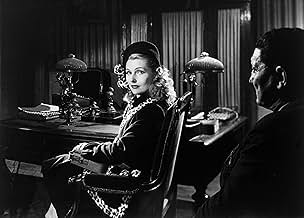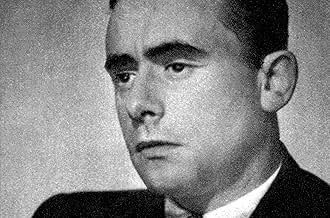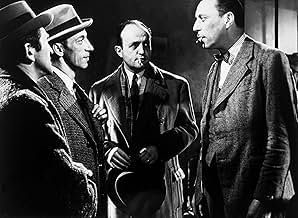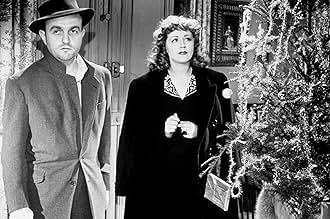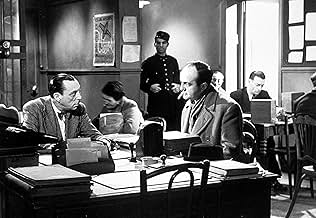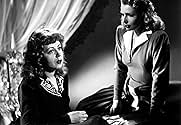PUNTUACIÓN EN IMDb
7,7/10
6,7 mil
TU PUNTUACIÓN
Añade un argumento en tu idiomaA jealous husband intends to kill the man his wife is meeting for business, but arrives to find the deed already done.A jealous husband intends to kill the man his wife is meeting for business, but arrives to find the deed already done.A jealous husband intends to kill the man his wife is meeting for business, but arrives to find the deed already done.
- Dirección
- Guión
- Reparto principal
- Premios
- 2 premios y 1 nominación en total
Henri Arius
- Léopardi
- (as Arius)
Charles Blavette
- Le gendarme Poitevin
- (as Blavette)
René Blancard
- Le commissaire principal de la P.J.
- (as R. Blancard)
Robert Dalban
- Paulo
- (as R. Dalban)
Jean Daurand
- L'inspecteur Picard
- (as J. Daurand)
Jean Dunot
- Nitram
- (as J. Dunot)
Jacques Grétillat
- Auguste
- (as J. Grétillat)
Gilberte Géniat
- Mme Beauvoir
- (as G. Géniat)
Gabriel Gobin
- Le patron du bistrot
- (as G. Gobin)
François Joux
- L' officier de police Fayard
- (as F. Joux)
Reseñas destacadas
10jotix100
"Quai des Orfevres", directed by the brilliant Henri-Georges Clouzot, is a film to treasure because it is one of the best exponents of French film making of the postwar years. M. Clouzot, adapting the Steeman's novel, "Longtime Defence", shows his genius in the way he sets the story and in the way he interconnects all the characters in this deeply satisfying movie that, as DBDumonteil has pointed out in this forum, it demonstrates how influential Cluzot was and how much the next generation of French movie makers are indebted to the master, especially Claude Chabrol.
The crisp black and white cinematography by Armand Thirard has been magnificently transferred to the Criterion DVD we recently watched. Working with Clouzot, Thirard makes the most of the dark tones and the shadows in most of the key scenes. The music by Francis Lopez, a man who created light music and operettas in France, works well in the context of the film, since the action takes place in the world of the music halls and night clubs.
Louis Jouvet, who is seen as a police detective, is perfect in the part. This was one of his best screen appearances for an actor who was a pillar of the French theater. Jouvet clearly understood well the mechanics for the creation of his police inspector who is wiser and can look deeply into the souls of his suspects and ultimately steals the show from the others. In an unfair comment by someone in this page, Jouvet's inspector is compared with Peter Falk's Columbo, the television detective. Frankly, and no disrespect to Mr. Falk intended, it's like comparing a great champagne to a good house wine.
Bernard Blier is perfect as the jealous husband. Blier had the kind of face that one could associate with the man consumed with the passion his wife Jenny Lamour has awakened in him. Martineau is vulnerable and doesn't act rationally; he is an easy suspect because he has done everything wrong as he finds in the middle of a crime he didn't commit, but all the evidence points to the contrary.
The other great character in the film is Dora, the photographer. It's clear by the way she interacts with Jenny where her real interest lies. Simone Renant is tragically appealing as this troubled woman and makes an enormous contribution to the film. Suzy Delair, playing Jenny, is appealing as the singer who suddenly leaps from obscurity to celebrity and attracts the kind of men like Brignon, the old lecher.
The film is one of the best Clouzot directed during his distinguished career and one that will live forever because the way he brought all the elements together.
The crisp black and white cinematography by Armand Thirard has been magnificently transferred to the Criterion DVD we recently watched. Working with Clouzot, Thirard makes the most of the dark tones and the shadows in most of the key scenes. The music by Francis Lopez, a man who created light music and operettas in France, works well in the context of the film, since the action takes place in the world of the music halls and night clubs.
Louis Jouvet, who is seen as a police detective, is perfect in the part. This was one of his best screen appearances for an actor who was a pillar of the French theater. Jouvet clearly understood well the mechanics for the creation of his police inspector who is wiser and can look deeply into the souls of his suspects and ultimately steals the show from the others. In an unfair comment by someone in this page, Jouvet's inspector is compared with Peter Falk's Columbo, the television detective. Frankly, and no disrespect to Mr. Falk intended, it's like comparing a great champagne to a good house wine.
Bernard Blier is perfect as the jealous husband. Blier had the kind of face that one could associate with the man consumed with the passion his wife Jenny Lamour has awakened in him. Martineau is vulnerable and doesn't act rationally; he is an easy suspect because he has done everything wrong as he finds in the middle of a crime he didn't commit, but all the evidence points to the contrary.
The other great character in the film is Dora, the photographer. It's clear by the way she interacts with Jenny where her real interest lies. Simone Renant is tragically appealing as this troubled woman and makes an enormous contribution to the film. Suzy Delair, playing Jenny, is appealing as the singer who suddenly leaps from obscurity to celebrity and attracts the kind of men like Brignon, the old lecher.
The film is one of the best Clouzot directed during his distinguished career and one that will live forever because the way he brought all the elements together.
A nice, humorous mix of music hall (in the first third mostly) and police procedural mystery as the various suspects' stories start to collapse. The final exposure of the murder may come as a surprise if you don't watch closely. A gritty look at Paris of the time. You can ignore the final scene (the Hollywood ending). Louis Jouvet is best as the police inspector who seems to be just passing through, but is really on top of things.
It takes a while for the scene to set, a subtle intriguing build up, just as you'd expect, but where is it going, this to-ing and fro-ing, as the alibis and excuses unwind and reset? To somewhere quite unexpected is the answer.
The extraordinarily adorable Suzy Delair plays a statuesque performer obsessed with succeeding in the theater. Her husband and accompanist, played by Bernard Blier, is a composed but jealous man. When he finds out in a less than preferable way that his flashy wife has planned a rendezvous with a lecherous old businessman with the intention of advancing her career, he loses all control and threatens the businessman with murder. Now, at that point, I must stop describing the film to you because it skates on such thin ice with its twists, revelations, ambiguities and suspense that to imply any of it would endanger it. I am not sure how good or bad that is for this French police procedural emanating from the song- and-dance community, though it is certainly interesting that what we do know throughout is who did not do it. We just don't know who did.
The story depends upon the procedure of following clues, where ideal alibis fail and where cautiously created fabrications and deceptions disintegrate. Interestingly, this is a suspense film in which suspense is generated in spite of the knowledge one would traditionally think too much too soon.
Quay of the Goldsmiths is the least dark of Henri-Georges Clouzot's films. It's nowhere near as sinister as the shocking Les Diaboliques, as tragic as the riveting Wages of Fear or as eery as Le Corbeau. Maybe it is due to the vibrance of the dance halls and theater settings of 1940s France, which all work as the milieu of this crime thriller.
Clouzot both understands and approves of his characters, even the more rotten ones, where he has more of a vindictive streak with his other films. Where he may have had understanding for the scheming women in Les Diabolique or the truck drivers who sink to the level of risking horrible death in order to oust themselves from miserable life in The Wages of Fear, there isn't necessarily support or agreement on the part of the filmmaker, for these are characters who plainly made the direct decisions that determine their fate. All the characters in this more settling film have scenes and moments that endear us to them, even the harsh, cold detective played by Louis Jouvet, who worries about his young adoptive son amid all the trouble and despair that happens in his life at any time with the drop of a hat.
There is humor and unabashed sexiness, the latter mostly on the part of Delair, that neutralize the pressure to a degree. Clouzot was quietly practicing his craft, patient till he made his unrelenting later films, in which he would permit his audiences no pardon from the tension.
The story depends upon the procedure of following clues, where ideal alibis fail and where cautiously created fabrications and deceptions disintegrate. Interestingly, this is a suspense film in which suspense is generated in spite of the knowledge one would traditionally think too much too soon.
Quay of the Goldsmiths is the least dark of Henri-Georges Clouzot's films. It's nowhere near as sinister as the shocking Les Diaboliques, as tragic as the riveting Wages of Fear or as eery as Le Corbeau. Maybe it is due to the vibrance of the dance halls and theater settings of 1940s France, which all work as the milieu of this crime thriller.
Clouzot both understands and approves of his characters, even the more rotten ones, where he has more of a vindictive streak with his other films. Where he may have had understanding for the scheming women in Les Diabolique or the truck drivers who sink to the level of risking horrible death in order to oust themselves from miserable life in The Wages of Fear, there isn't necessarily support or agreement on the part of the filmmaker, for these are characters who plainly made the direct decisions that determine their fate. All the characters in this more settling film have scenes and moments that endear us to them, even the harsh, cold detective played by Louis Jouvet, who worries about his young adoptive son amid all the trouble and despair that happens in his life at any time with the drop of a hat.
There is humor and unabashed sexiness, the latter mostly on the part of Delair, that neutralize the pressure to a degree. Clouzot was quietly practicing his craft, patient till he made his unrelenting later films, in which he would permit his audiences no pardon from the tension.
Quai des Orfèvres is directed by Henri-Georges Clouzot and Clouzot co-writes the screenplay with Jean Ferry. It is based on the novel Legitime defense written by Stanislas-André Steeman . it stars Louis Jouvet, Suzy Delair, Bernard Blier and Simone Renant. Music is by Francis Lopez and cinematography by Armand Thirard.
When high profile business man Georges Brignon is found murdered all evidence points to jealous husband Maurice Martineau - Inspector Antoine takes up the case.
Following the backlash and fallout from Le Corbeau in 1943, Henri-Georges Clouzot wasn't allowed to make a film for four years, his return brought about Quai des Orfevres. Although a highly respected master of his craft, Clouzot was frowned upon for the dark approach to human nature in some of his films, whilst his treatment of the actors under his direction is legendary in a bad way. So how interesting to find that his comeback picture is actually one of his most accessible, very much thriving on human interest factors for literally everyone in the picture!
This a traditional police who done it procedural in core essence, one that does come with coincidences and contrivances, and yet the characters are so richly drawn, their lives so compelling, that the simplicity of plot is actually irrelevant. We are in post war Paris and the back drop is the world of theatre and nightclubs. Clouzot offers up in the fist instance some film noir staples, a possible femme fatale, gay love from afar, cuckold husband and a grotesque murder victim. Even the acts on the stage have a weirdness to them, Wheeling Winos - one with a paper mache head! Dogs that walk on their hind legs! How wonderful. The clubs are smoky, the streets dimly lighted for menacing atmosphere, Clouzot and Thirard have created a splendid moody world from which to spin the tale.
I'll take him for a ride, and what a ride!
Pitched at the front is Jenny Lamour (Delair), who is not beyond using her sexuality to further her stage career, which of course doesn't sit well with her highly jealous husband Maurice (Blier), a man clearly punching above his weight with Jenny. Ah but Clouzot is a crafty devil, he has let us into a secret that undermines us the viewer's expectations and that of Maurice. This keeps the question of who is the murderer - and the motive - as a constant intrigue. There's little slices of sexy sauce to tantalise, and the whole play developes into a sort of tragic comedy, but always the characterisations of the key players are earthy and dealing in foibles. Then Inspector Antoine (Jouvet excellent) holds court, a grumpy but stoically deceptive man of his work, film noir has itself another policeman of note.
Visually there's some treats, such as the dark shadowy walk that Maurice takes to Villa St Marceaux, arriving at the house which instantly looks like a noir nightmare. Better still is a sequence as we get towards the denouement, Maurice in a holding pen, a sexy lady in the pen next door, as bells ring out she is framed in shadowed bars whilst Maurice's mind begins to fracture. The craft on show is sublime at times, visually and on the page. I'm not over enamoured with Delair as an actress, but conversely Renant is quality and gorgeous into the bargain, while I think the ending should have really gone into black hearted territory. All told though, and this is Clouzot's least suspenseful film that I have seen, this is well worthy of time investment for lovers of classic French cinema. 7.5/10
When high profile business man Georges Brignon is found murdered all evidence points to jealous husband Maurice Martineau - Inspector Antoine takes up the case.
Following the backlash and fallout from Le Corbeau in 1943, Henri-Georges Clouzot wasn't allowed to make a film for four years, his return brought about Quai des Orfevres. Although a highly respected master of his craft, Clouzot was frowned upon for the dark approach to human nature in some of his films, whilst his treatment of the actors under his direction is legendary in a bad way. So how interesting to find that his comeback picture is actually one of his most accessible, very much thriving on human interest factors for literally everyone in the picture!
This a traditional police who done it procedural in core essence, one that does come with coincidences and contrivances, and yet the characters are so richly drawn, their lives so compelling, that the simplicity of plot is actually irrelevant. We are in post war Paris and the back drop is the world of theatre and nightclubs. Clouzot offers up in the fist instance some film noir staples, a possible femme fatale, gay love from afar, cuckold husband and a grotesque murder victim. Even the acts on the stage have a weirdness to them, Wheeling Winos - one with a paper mache head! Dogs that walk on their hind legs! How wonderful. The clubs are smoky, the streets dimly lighted for menacing atmosphere, Clouzot and Thirard have created a splendid moody world from which to spin the tale.
I'll take him for a ride, and what a ride!
Pitched at the front is Jenny Lamour (Delair), who is not beyond using her sexuality to further her stage career, which of course doesn't sit well with her highly jealous husband Maurice (Blier), a man clearly punching above his weight with Jenny. Ah but Clouzot is a crafty devil, he has let us into a secret that undermines us the viewer's expectations and that of Maurice. This keeps the question of who is the murderer - and the motive - as a constant intrigue. There's little slices of sexy sauce to tantalise, and the whole play developes into a sort of tragic comedy, but always the characterisations of the key players are earthy and dealing in foibles. Then Inspector Antoine (Jouvet excellent) holds court, a grumpy but stoically deceptive man of his work, film noir has itself another policeman of note.
Visually there's some treats, such as the dark shadowy walk that Maurice takes to Villa St Marceaux, arriving at the house which instantly looks like a noir nightmare. Better still is a sequence as we get towards the denouement, Maurice in a holding pen, a sexy lady in the pen next door, as bells ring out she is framed in shadowed bars whilst Maurice's mind begins to fracture. The craft on show is sublime at times, visually and on the page. I'm not over enamoured with Delair as an actress, but conversely Renant is quality and gorgeous into the bargain, while I think the ending should have really gone into black hearted territory. All told though, and this is Clouzot's least suspenseful film that I have seen, this is well worthy of time investment for lovers of classic French cinema. 7.5/10
¿Sabías que...?
- CuriosidadesHenri-Georges Clouzot wrote almost two-thirds of the film only having read the novel years before, recalling it from memory, since it was out of print by the time he started the screenplay. When the novelist Stanislas-André Steeman saw the film, he was furious about the differences between the novel and the film.
- PifiasWhen Antoine is repeating Maurice's deposition to the typist, he says that the confrontation between Maurice and Brignon at the restaurant took place on Wednesday, December 2, 1946. In 1946, December 2 fell on a Monday.
- Citas
L'inspecteur adjoint Antoine: I have to admit, I've taken a liking to you, Miss Dora Monier.
Dora Monier: Me?
L'inspecteur adjoint Antoine: Because I have to say, you're just my type. When it comes to women, we'll never have a chance.
Selecciones populares
Inicia sesión para calificar y añadir a tu lista para recibir recomendaciones personalizadas
- How long is Jenny Lamour?Con tecnología de Alexa
- Why did they discuss swapping butter and shoes?
Detalles
Taquilla
- Recaudación en Estados Unidos y Canadá
- 180.974 US$
- Fin de semana de estreno en EE. UU. y Canadá
- 9632 US$
- 27 oct 2002
- Recaudación en todo el mundo
- 181.041 US$
- Duración1 hora 46 minutos
- Color
- Relación de aspecto
- 1.37 : 1
Contribuir a esta página
Sugerir un cambio o añadir el contenido que falta

Principal laguna de datos
By what name was En legítima defensa (1947) officially released in Canada in English?
Responde
![Ver Bande-annonce [OV]](https://m.media-amazon.com/images/M/MV5BMmI1MGQ3ZWItMWI3Yi00M2RhLTkwMzEtODUyZWE5NmVhZGRlXkEyXkFqcGdeQXRyYW5zY29kZS13b3JrZmxvdw@@._V1_QL75_UX500_CR0)
